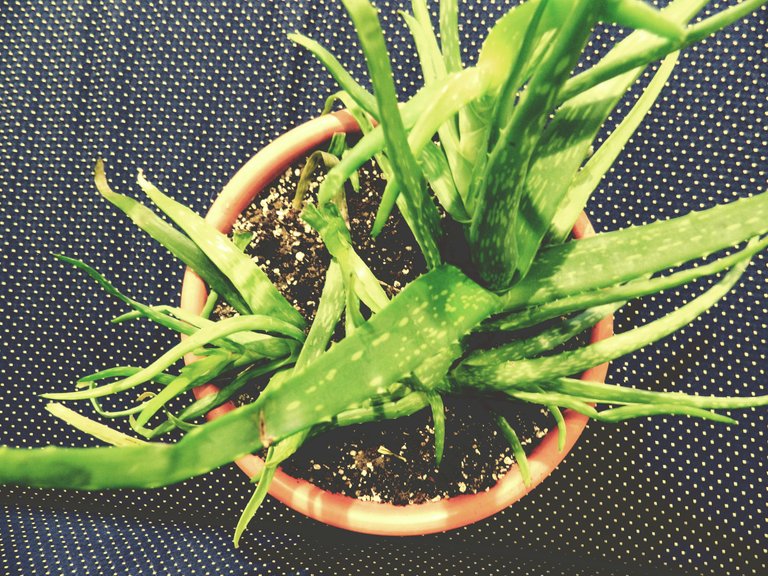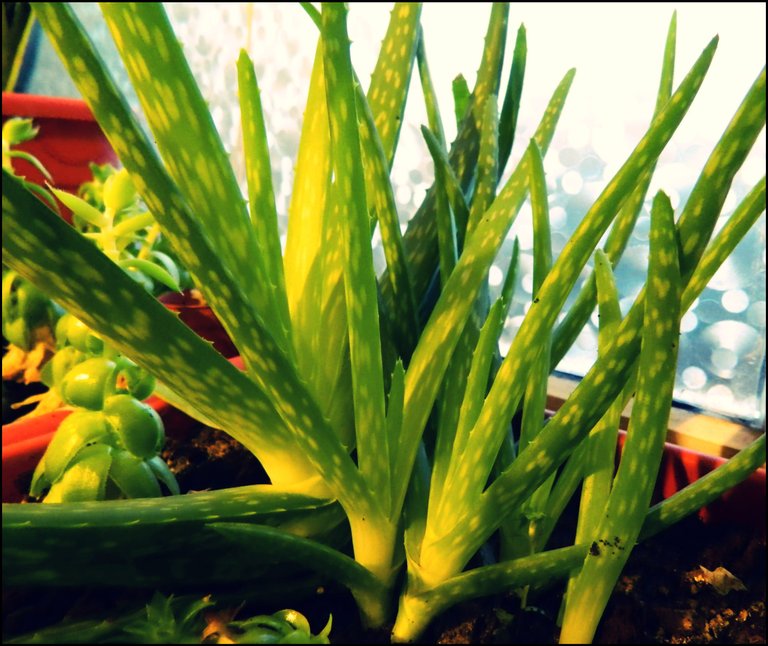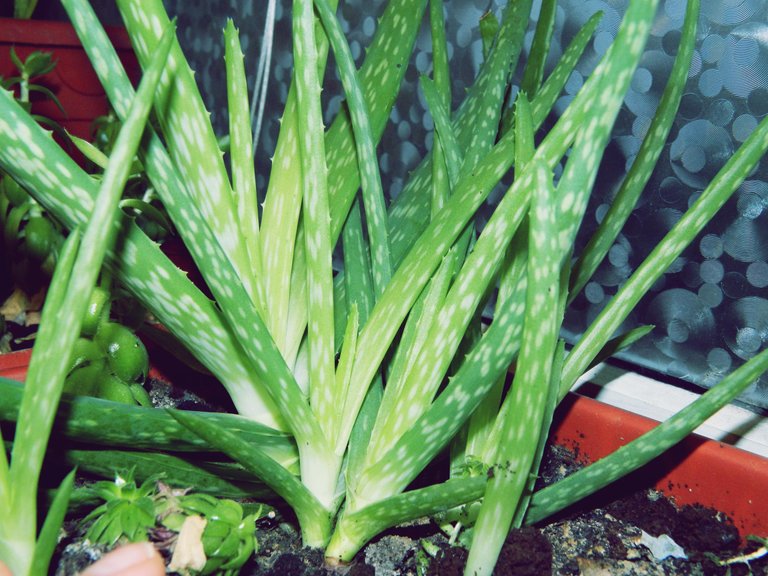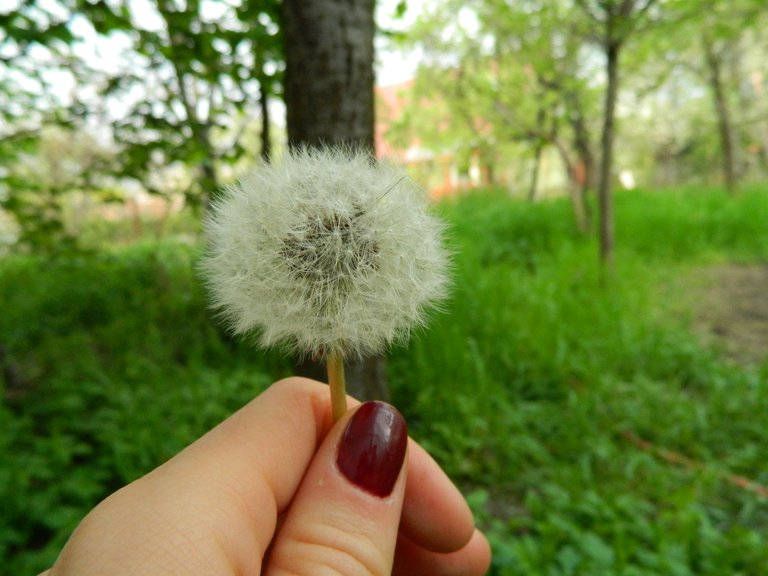Hey guys,
Like I said in the headline, I cant sum-up in one post all the benefits of this super plant. Aloe Vera is so appreciated in this world! And its no wonder cause it has wonderful properties.
I have many Aloe Vera plants in my home and I use the gel of Aloe and also I use it as a natural cosmetic. I found it very very special, thats why I'm writting about it.
The photos in this post are mine and they are my Aloe vera Plants. It is really really easy to grow them. You basically do nothing. Just give them some water from now and then. They need light. They dont support to much sun/warmth but also not to cold. At least this is what I've experienced with these plants.
- Nutritionally: rich in sterols (vegetal steroids), aminoacids and polysaccharides
- Physiological: strengthens all organs and tissues. It's a miracle for the liver especially.
- Benefits: restores damaged tissues, reduces inflammation, helps digestion and increases free flow of energy through all meridians (these are just a few)

THE MAIN CONSTITUENTS
Aloe vera is an extremely powerful herb that is part of the lily family. It is made up of two main elements: the gel, which is found inside the leaves, and the essence, which is derived from juice, obtained from the cells under the thick, outer skin.
The alove vera gel contains many active ingredients: 18 aminoacids, organic acids, vitamins, minerals, mineral salts, sterols, bradykinin (an enzyme), salicylates (aromatic acids) and polysaccharides (complex sugars). Although some of the nutrients are not strong enough to have their own therapeutic action, the synergistic effect of all the ingredients gives the plant more efficiency.
BENEFICIAL PROPERTIES
Aloe Vera acts by causing four types of basic activities in the body: anti-inflammatory, antibacterial, immune stimulation, and general tissue restoration.

1. Anti-inflammatory effect
The antiinflammatory action of the Aloe plant is due to a series of factori.The bradykinin enzyme help reduce excessive inflammation when applied to the skin, thereby reduce the pain too. Aloe contains four plant steroids, which are important anti-inflammatory and contains salicylic acid, a compound type of aspirin, having anti-inflammatory and antibacterial properties.
These anti-inflammatory properties of the plant are partly responsible for the excellent results on the intestinal tract. The gel forms a protective layer on the intestinal tract, which has been shown to last up to 48 hours.
It also favors a correct pH balance (acid-base) in the food tube and calms the intestinal tissues. Aloe vera, therefore, helps healing colitis, ulcer, candidiasis and Crohn's disease.

2. Strengthes the immune system
Glucomannan, the essential compound of Aloe vera, is primarily responsible for the immune stimulating properties of this plant. This role is achieved by the increased activity of special leukocytes, called macrophages, which swallow bacteria and residues.
This activity helps protect and detoxify the body. At the same time, the macrophages secrete messenger chemicals that stimulate other parts of the immune system. A remarkable study has been made about the effects of Aloe glucomannan on human leukocytes, which concluded that Aloe is important for the immune system because of the high glucomannan content that has a direct effect on the immune system, activating and stimulating macrophages , mannotes, anti-bodies and cells.

3. The healing effect
Aloe vera has an important role in healing damaged tissues. Glucomanan is also the main ingredient responsible for the moisturizing and healing qualities of this plant. This glucomannan, along with other plant constituents, accelerates the healing process of damaged surfaces. The presence of prostaglandins and essential fatty acids in Aloe vera was an amazing discovery.
Aloe has the natural ability to turn essential fatty acids into prostaglandins (health protectors). This property is very rare for a plant.
The essential fatty acid of the highest importance in this plant is gamma-linoleic acid, which plays an important role in the healing of wounds and inflammation of the body's tissues. At the same time, Aloe hurries the tissue regeneration process by stimulating fibroblasts, cells that are very widespread in connective tissues and are responsible for producing collagen. Collagen stimulates the formation of new tissues. Plant growth hormones from Aloe, e.g. giberalic acid, also help wound healing, improving the protein synthesis process.

4. Antibacterial effect
Aloe vera is also very useful in eliminating and regulating the level of microbial toxins and intestinal toxicity, excess acid in the stomach, or improving intestinal peristalsis (the valved bowel movement that removes residues).
Moreover, it has been shown that the aloe plant also acts against many bacteria known as fungi because it contains caprylic acid. In large amounts, Aloe is effective against many pathogens that affect the intestines such as Candida albicans or Citrobacter, and it acts as a catalyst.

(just me, in my garden)
5. A lot of other benefits
- Aloe has beneficial, refreshing and tonifying benefits in treating menopausal problems.
- It acts as an active tonic for the liver and the entire digestive tract. Thus, it increases the secretion of digestive enzymes, balances the activity of the stomach, helps digestion and regulates the level of sugar and the metabolism of fats.
- Applied locally, it is used to treat wounds, bumps, burns and scalds.
- It has a general "calming" and "wetting" effect on organs and can be used to treat overheating and inflammation disorders such as fever, gastritis, hepatitis, gland inflammation and herpes. In particular, it has a refreshing effect on the tired liver.
- In a study, Aloe has been shown to be effective in treating gastroduodenal ulcers. After 12 months of treatment, patients have healed completely by ingesting a spoonful of Aloe Daily Gel daily.
- Aloe helps to normalize the level of blood sugar.
- Glucomannon in Aloe has been given important antiviral, immunostimulating and bone-restoring properties.
HOW TO CONSUME THE ALOE PLANT
Aloe is in the form of juice, gel or tablets.
Aloe can have a good taste when mixed with fruit juice, eg a quarter cup of Aloe juice added to three quarters of an apple juice glass.
~~~~~~~~~~~~~~~~~~~
P.S. I can't write these things for you unless I study them. So, I want to mention Dr. Gillian McKeith's book , Raw Food for Health . 12 Natural Superfoods for Health Enhancement, from where I've read all this great infos!
I know this is a long article, but it's what it is:) Hope you have the time to read it. I think its an investmen for our own health; studying about natural remedies/plants that helps us maintaing our health.
Have a great time,
& Stay healthy
Miss Deli

I love Aloe Vera the drink and i loved this post. Do you think the aloa vera drink has any benefits other than it tasting good lol.
If you read my post, you'll learn about the benefits of Aloe, other than good tasting:)
I always loved aloe Vera's refreshing touch and the drink. Used to burn somewhere on my leg and aloe Vera helped a lot. I was looking forward to someone featuring this amazing plant and you did. Thanks @missdeli. It is very elaborate. Will resteem this :)
Yes, I also burned myself and Aloe helped a lotttttttt. btw, lavander essential oil it's great for burns, mixted with coconut oil. Thank you so much for resteeming my article and thanks for you kindly words. I'm very glad you find it useful for you! :)
I have been using Aloe juice for some time, it is definitely good for digestive healing. But you have just educated me on so many more benefits that I was not aware of. Thankyou.
This is a good thing, using Aloe! I think it is a "Wonder-Plant" and yes, my mom used it for digestive healing and it really works:). you're very welcome @white.tiger :)